


When it comes to leaking heart valves, life expectancy can vary quite a bit. Factors like the severity of the condition, how quickly it’s diagnosed, and the effectiveness of treatment all play a role. It’s important to know that early intervention and making heart-healthy lifestyle changes can significantly improve outcomes. Studies have shown that patients who receive prompt surgical care and adopt healthier habits often experience better survival rates and an enhanced quality of life.
Have you or a loved one been feeling concerned about heart health? It’s completely understandable to feel anxious. The good news is that there are effective solutions available. By seeking help early, you can take proactive steps towards better health. In addition to medical treatment, lifestyle modifications can make a real difference. Simple changes, like eating a balanced diet and staying active, can support your heart and overall well-being.
Remember, you’re not alone in this journey. Many patients have found comfort and improvement through timely care and support. If you’re feeling uncertain, consider reaching out to a healthcare professional who can guide you through your options. Together, you can create a plan that prioritizes your health and peace of mind.
Ultimately, taking action now can lead to a brighter future. Don’t hesitate to seek the help you deserve. Your heart health matters, and with the right support, you can navigate this path with confidence.
Understanding the implications of a leaking heart valve is essential for anyone facing this condition. It can significantly affect not just life expectancy but overall health as well. In this article, we’ll explore ten key insights that shed light on the risks, treatment options, and lifestyle changes that can improve outcomes for those affected. With the right knowledge and proactive measures, you can navigate your heart health journey more effectively.
But what are the most pressing questions surrounding leaky heart valves? How can timely intervention truly make a difference in extending life expectancy? Let’s delve into these concerns together, ensuring you feel supported every step of the way.
At Amavita Heart and Vascular Health, led by the compassionate Dr. Pedro Martinez-Clark, who is educated at Harvard, we understand the concerns of individuals facing cardiovascular challenges, especially regarding leaking heart valve life expectancy. Our commitment is to provide exceptional cardiovascular services tailored to your needs. We utilize advanced techniques like cardiac catheterization and chamber repair, along with minimally invasive procedures, to ensure you receive the best possible care and a quicker recovery.
In addition to our cutting-edge technology, we pride ourselves on our patient-centered approach. We believe that compassionate care is just as important as medical expertise. Our dedication to community health initiatives, such as the Miami Initiative to Stop Amputation (MISA), reflects our commitment to improving lives beyond the clinic. We want you to feel supported and valued every step of the way.
Choosing Amavita means you’re not just getting expert medical attention; you’re also gaining a partner in your health journey. We’re here to help you navigate your cardiac conditions with understanding and care, ensuring that your quality of life is our top priority. If you have any questions or concerns, please don’t hesitate to reach out. Your health matters to us, and we’re here to support you.
Leaky cardiac passages can significantly affect a person's health, influencing symptoms and ultimately impacting leaking heart valve life expectancy, which may include:
You might also experience chest pain or a persistent cough. It's important to note that shortness of breath and fatigue are particularly common among those with this condition, often making daily activities feel overwhelming. Recognizing these warning signs early is essential; timely intervention can significantly improve your health and well-being.
When the cardiac structures don’t open or close properly, your heart has to work harder, which can cause breathlessness and exhaustion. At Amavita Heart and Vascular Health, Dr. Martinez-Clark specializes in minimally invasive procedures that can repair or replace damaged structures without the need for open-heart surgery. This approach can greatly enhance your breathing and energy levels, allowing you to enjoy life more fully.
Recent studies, such as the TRILUMINATE research, show that patients who receive timely care for a leaking heart valve life expectancy have better outcomes. In fact, 87% of individuals undergoing the TriClip procedure reported significant improvements. It’s also crucial to understand that one in four healthy individuals over 60 may have undiagnosed cardiovascular issues. This highlights the importance of being aware of your health and seeking regular screenings.
Understanding these symptoms and taking proactive steps is vital for maintaining your cardiovascular health. Remember, you’re not alone in this journey, and support is available to help you every step of the way.
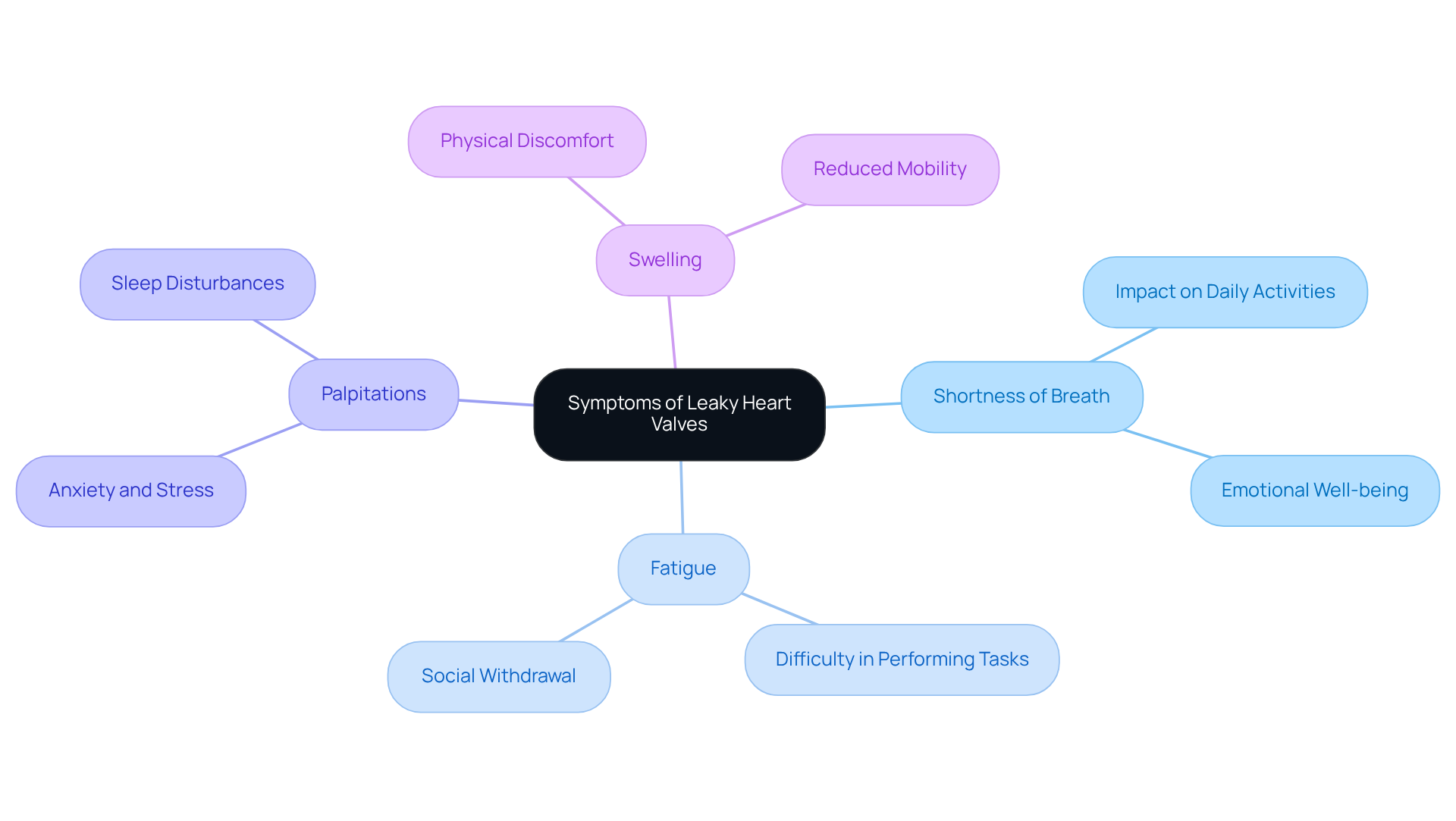
Leaky cardiac structures can be a source of concern for many, impacting overall well-being. One of the primary causes is age-related degeneration, where our heart structures naturally deteriorate over time. This can lead to conditions like aortic regurgitation, often beginning to show signs in individuals around the ages of 40 to 50. Regular health check-ups become essential during this time, allowing for early detection and timely intervention.
Congenital defects also contribute significantly to leakage. Some individuals are born with structural abnormalities that make them more susceptible to issues with their cardiac valves. Additionally, rheumatic fever, which can arise from untreated strep throat, remains a notable concern, especially in older children and adolescents. This condition can cause lasting damage to the heart, necessitating ongoing observation and care.
Another important factor is infective endocarditis, an infection of the heart lining. This occurs when bacteria enter the bloodstream and attach to damaged heart tissue, potentially leading to serious complications if not addressed quickly. Furthermore, conditions like elevated blood pressure and coronary artery disease can exacerbate the risk of valve dysfunction, highlighting the interconnected nature of cardiovascular health.
Understanding these factors is crucial for both patients and healthcare providers. By recognizing the signs and symptoms associated with cardiac leakage, individuals can take proactive steps in managing their health. This ensures that they receive prompt medical attention, ultimately leading to better outcomes. Remember, you’re not alone in this journey; support is available, and taking action can make a significant difference.

Identifying leaking cardiac structures begins with a careful review of your medical history and a physical examination. Following this, advanced diagnostic tests, particularly echocardiograms, play a vital role. These non-invasive tests use sound waves to create detailed images of your heart's structures and blood flow, allowing healthcare providers to assess its function accurately. Echocardiograms are essential for spotting cardiac issues, significantly improving diagnostic accuracy and individual outcomes, which helps reduce hospital readmissions.
For example, the TRILUMINATE study, which included participants averaging 78 years old, showcased how effective echocardiograms are in diagnosing severe tricuspid regurgitation, a common issue that can affect leaking heart valve life expectancy. Cardiologists emphasize the importance of these tests, noting that they provide invaluable insights into cardiovascular health. As Dr. Nish Patel wisely points out, "Anytime an individual aged 65 and older exhibits symptoms such as fatigue, they should seek a cardiology assessment, as these may be associated with underlying valvular cardiac disease."
In addition to echocardiograms, other diagnostic tools like electrocardiograms (ECGs) and chest X-rays can help evaluate heart function and identify any abnormalities. At Amavita, we offer advanced diagnostic capabilities, including hospital-quality cardiac assessment tools available at your bedside 24/7, ensuring timely and effective evaluations. This combination of techniques not only allows for thorough assessments but also enhances our ability to stand out in the market, increasing referrals as hospitals prefer facilities with proven cardiac expertise.
With cardiovascular diseases becoming more common, the role of echocardiograms in early diagnosis and management is more crucial than ever. This ultimately leads to better patient outcomes and fewer hospital readmissions. Remember, seeking help is a sign of strength, and we’re here to support you every step of the way.
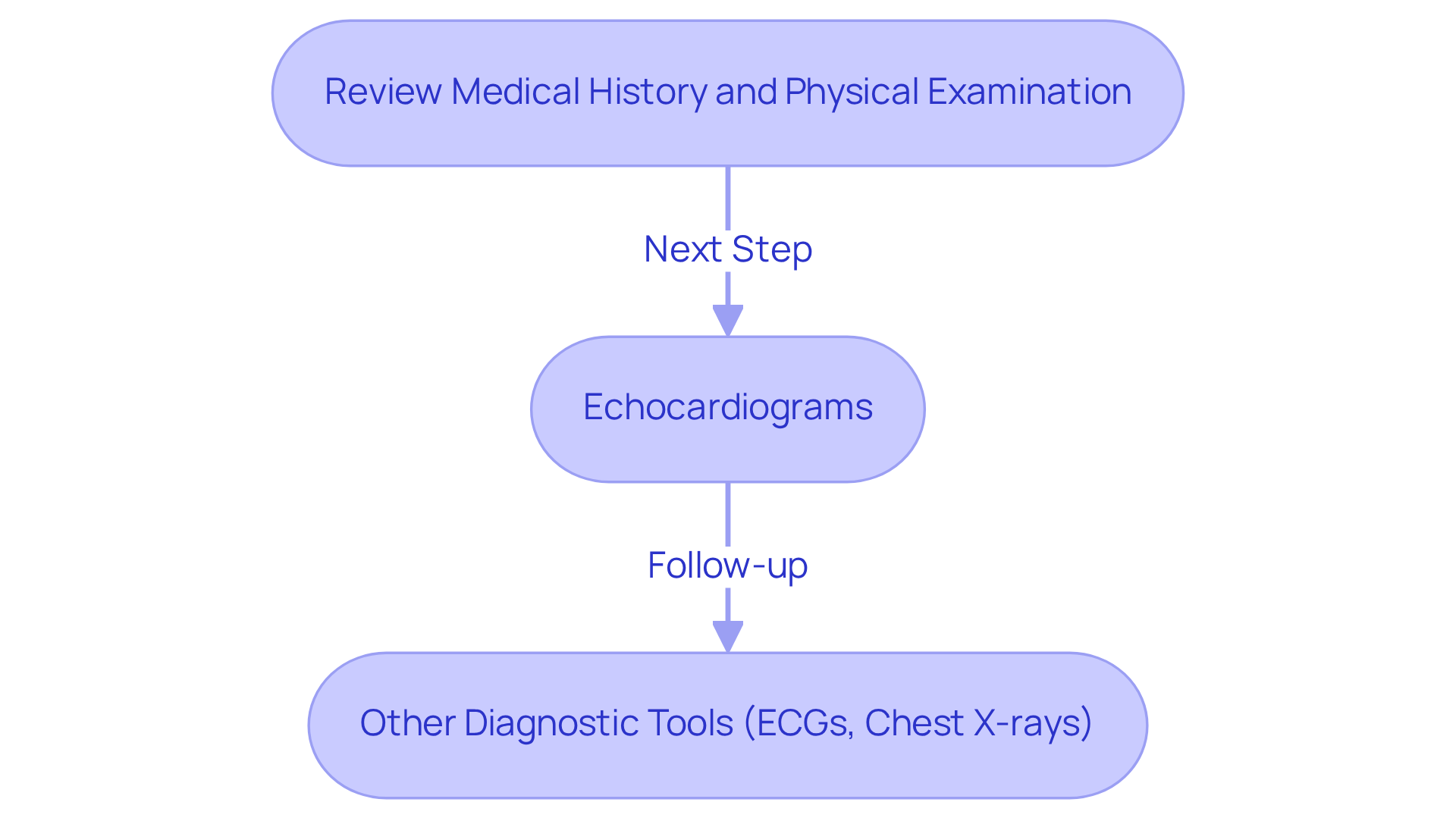
Neglecting leaky cardiac structures can lead to serious health issues, including:
These complications can significantly affect the leaking heart valve life expectancy, especially for older adults. Have you or a loved one been experiencing symptoms? Research indicates that individuals with symptomatic severe aortic regurgitation have a leaking heart valve life expectancy that is grim, with only about 28% surviving three years without surgical intervention.
Cardiologists stress the importance of early intervention. As Dr. Payal Kohli puts it, 'Surgery can restore a person’s quality of life and the typical life expectancy, even in cases involving a leaking heart valve life expectancy.' This is where Amavita's CardioElite™ program comes into play. It acts as a clinical force multiplier, enhancing proactive care by providing advanced, real-time diagnostic information, AI integration, and 24/7 cardiology consultation. These resources are essential for effectively managing patients with leaky cardiovascular structures.
Minimally invasive options like Mitraclip and transcatheter aortic replacement (TAVR) are available and can significantly improve outcomes. Identifying symptoms and seeking medical guidance promptly is crucial. With comprehensive management approaches like those offered by CardioElite™, you can take vital steps towards addressing leaky cardiac structures and enhancing your overall health. Remember, you’re not alone in this journey; support is available to help you navigate your health concerns.
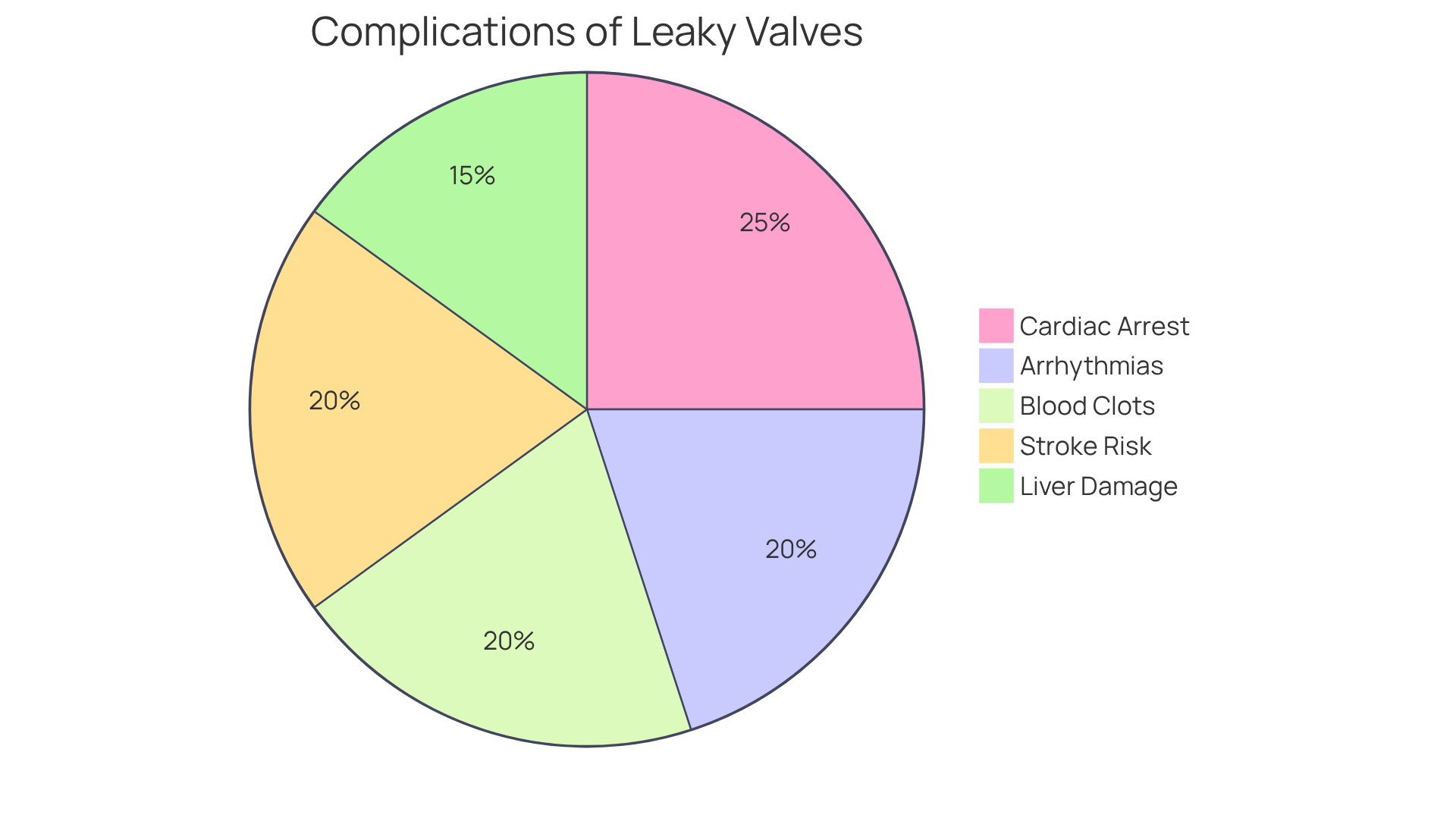
For individuals facing leaky heart structures, the journey often begins with medication aimed at managing symptoms and preventing complications. But when the condition becomes severe, surgical intervention is essential. Thankfully, options like repair or replacement of the device can now be performed using minimally invasive methods, which have truly transformed cardiovascular care. These advancements not only enhance the safety and effectiveness of procedures but also significantly improve life expectancy and overall quality of life for those affected.
Minimally invasive heart surgery, including techniques like minimally invasive aortic replacement (MIAVR), has shown results comparable to traditional methods. Research indicates that individuals undergoing MIAVR typically enjoy a shorter postoperative stay—often reduced by one day—without compromising survival rates. In fact, survival rates at one year exceed 94% for both MIAVR and conventional aortic replacement (CAVR), highlighting the effectiveness of these modern approaches.
Leading cardiologists emphasize the advantages of minimally invasive techniques, reassuring patients that they are safe alternatives to conventional surgery. With an operative mortality rate of just 2% in octogenarians undergoing MIAVR, these procedures are particularly beneficial for older individuals who may face greater surgical risks.
Success stories abound, with many patients reporting significant improvements in their health and quality of life following repair or replacement. The integration of cutting-edge technologies and methods in cardiac surgery continues to pave the way for better outcomes, making surgical intervention a vital option for those concerned about leaking heart valve life expectancy.
If you or a loved one are facing these challenges, know that there is hope and support available. Don't hesitate to reach out for guidance and care.
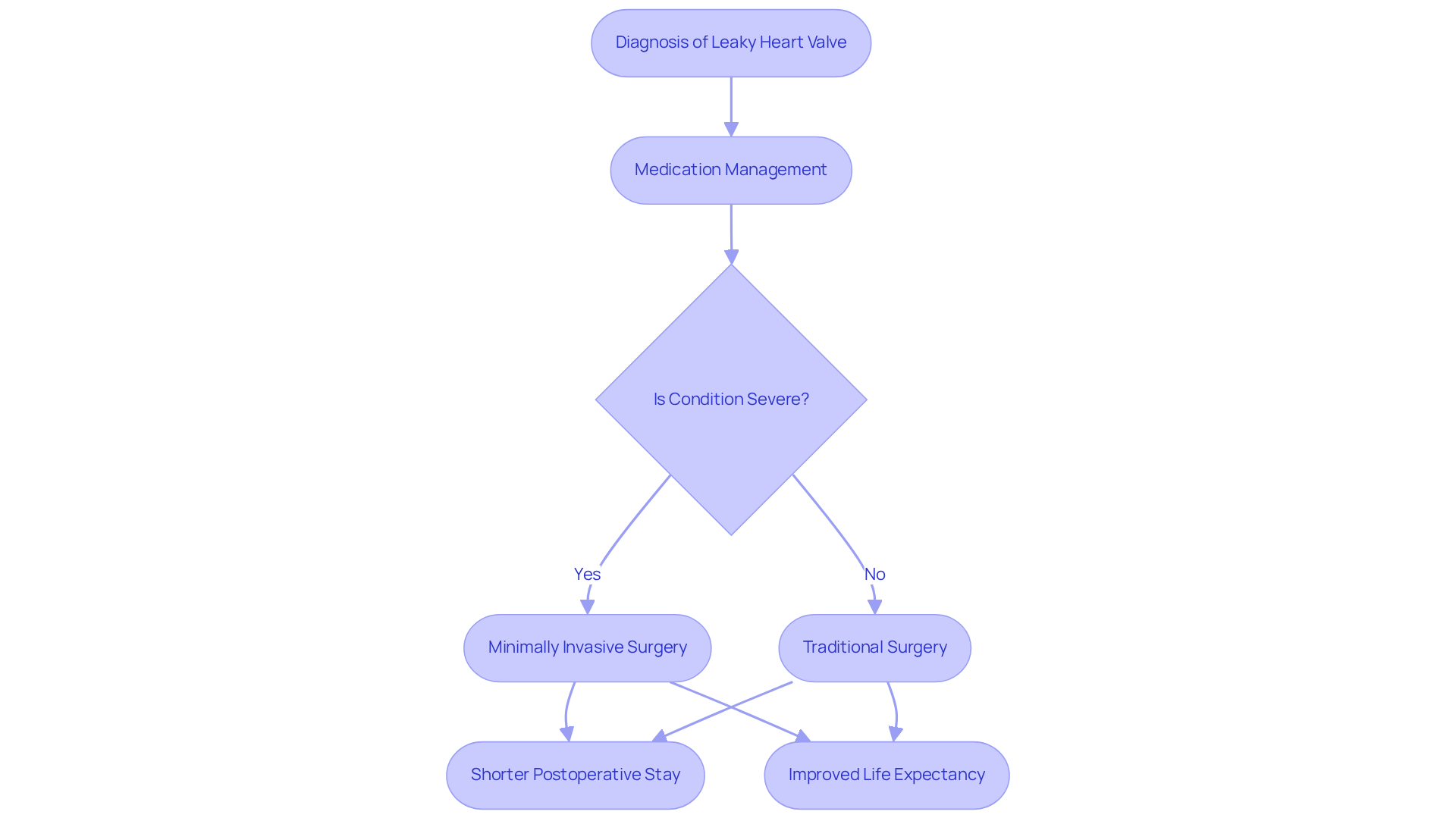
Taking care of your heart is especially important if you have leaky valves, particularly when considering leaking heart valve life expectancy, and this is particularly true for our elderly loved ones. Here are some gentle recommendations to help you embrace a heart-healthy lifestyle:
Real-life stories show how these lifestyle changes can make a difference. For instance, people who adopted the DASH diet, focusing on low-fat dairy, fruits, and vegetables, experienced notable drops in blood pressure and improved heart health. Additionally, those who engaged in regular physical activity reported feeling better and managing their heart conditions more effectively.
By embracing these heart-healthy practices, you not only support the management of leaky valves but also enhance your leaking heart valve life expectancy and improve your quality of life. Remember, you’re not alone on this journey; there’s support available to help you every step of the way.
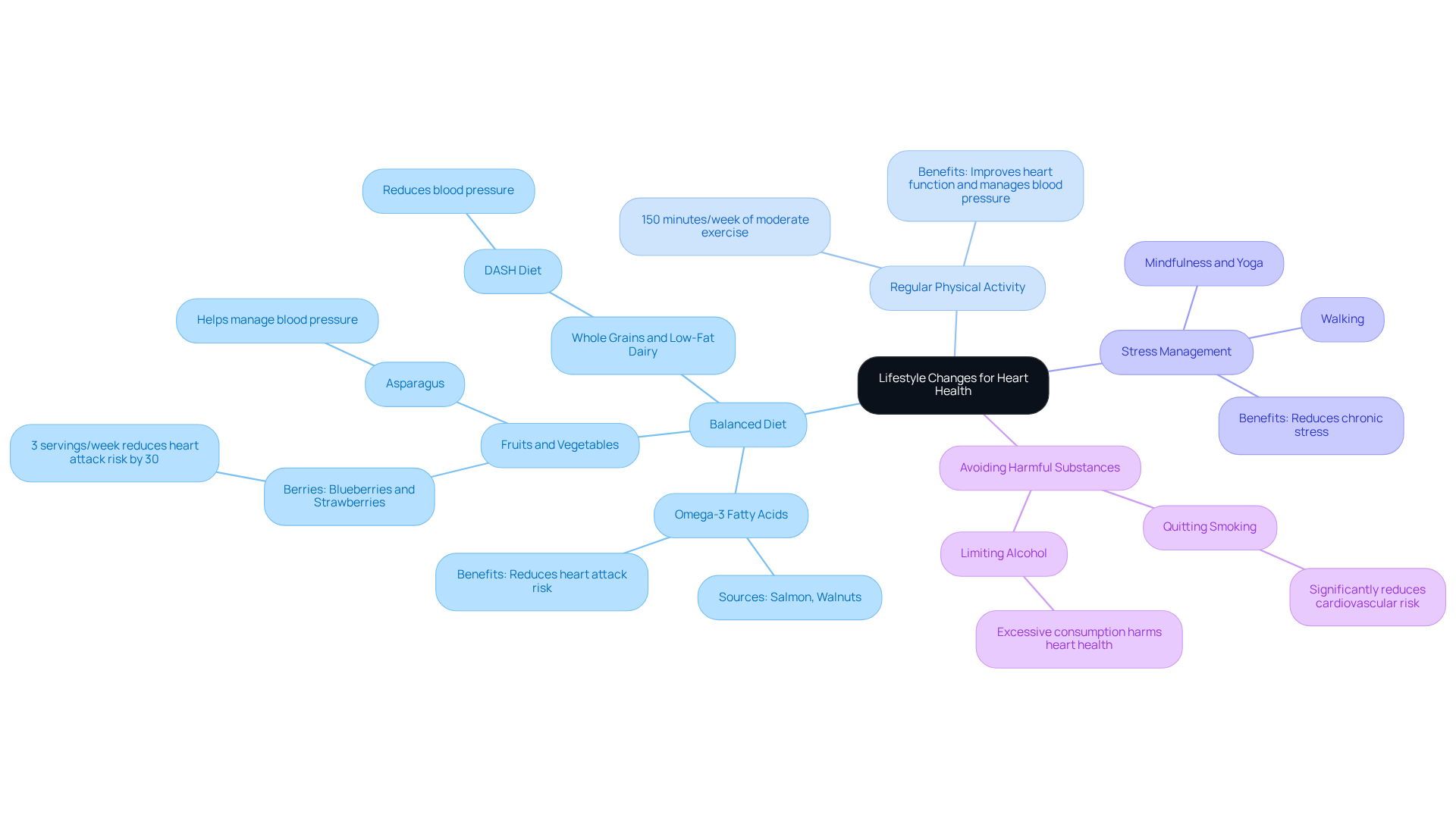
Routine follow-up visits are essential for individuals considering their leaking heart valve life expectancy. They allow for continuous observation of your condition, helping to ensure your heart stays healthy. Typically, these visits include echocardiograms to assess heart function and detect any changes over time. Recent recommendations suggest that if you have severe asymptomatic valve disease, you should be monitored every 6 to 12 months. This proactive approach helps catch any decline early, enabling timely interventions that are crucial for preserving your cardiovascular health and improving your life expectancy.
Research shows that sticking to regular follow-up schedules can lead to significantly better outcomes. For example, a study found that those who followed the guidelines had fewer events related to all-cause mortality and heart failure hospitalization compared to those who didn’t. Cardiologists emphasize that consistent monitoring not only improves clinical outcomes but also enhances your quality of life. As one specialist noted, "Prompt diagnosis and treatment of heart issues can lead to better management of symptoms and overall well-being."
Arrhythmias, which may feel like palpitations or dizziness, can indicate underlying cardiac problems. Regular monitoring helps identify these symptoms early, allowing for appropriate management of any arrhythmias. Real-world examples highlight the benefits of routine follow-ups. Patients who engaged in regular monitoring reported better management of their conditions, resulting in fewer hospitalizations and improved overall health. By prioritizing follow-up care, individuals can significantly enhance their outlook and quality of life, especially those concerned about leaking heart valve life expectancy.
So, if you’re feeling uncertain or anxious about your heart health, remember that you’re not alone. Regular check-ups can make a world of difference, and reaching out for support is a positive step towards better health.
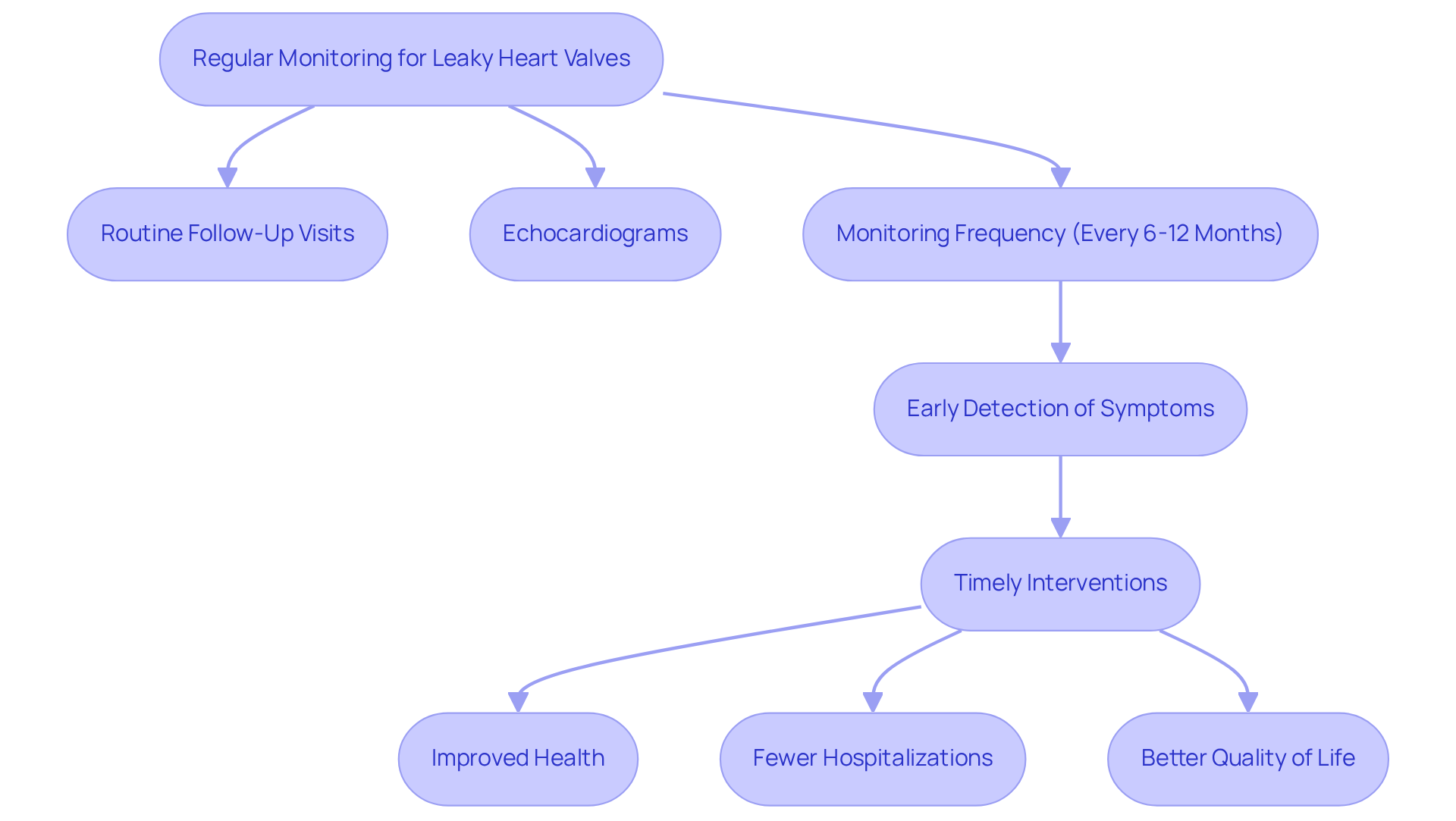
Living with a leaking cardiac structure can bring about significant emotional challenges, including heightened anxiety and depression. Did you know that studies show over 50% of individuals who undergo cardiac surgery report facing these psychological hurdles afterward? These challenges can negatively impact recovery and overall treatment outcomes. For those dealing with cardiac issues, addressing emotional factors is crucial, as psychological concerns can lead to increased distress, which is linked to a 130% to 181% higher rate of future coronary disease occurrences.
At Amavita, we truly understand the essential role healthcare providers play in tackling these psychological issues. Our comprehensive care strategy includes effective support systems, such as counseling and mental wellness resources, alongside our specialized heart care services like cardiac catheterization and heart valve repair. These resources can significantly enhance your quality of life. Research indicates that individuals who receive tailored pre-operative education experience lower levels of anxiety and depression after surgery, underscoring the importance of proactive mental well-being support.
Real-world examples highlight the positive impact of mental wellness interventions. For instance, individuals who underwent mitral valve repair surgery at Amavita showed remarkable improvements in both emotional and physical well-being, with psycho-emotional symptoms returning to levels seen in control individuals just six months post-operation. In contrast, those who did not receive surgical intervention experienced no improvement, emphasizing the critical nature of timely treatment.
Mental wellness experts emphasize that addressing anxiety and depression in individuals with cardiac issues is not just beneficial; it’s vital for optimal recovery. As one expert pointed out, pre-operative distress can predict post-operative distress, suggesting that early intervention can lead to better outcomes. Additionally, protective factors like social support and pre-operative education play a key role in alleviating psychological distress. By integrating mental health support into our treatment strategy, Amavita healthcare providers can help individuals manage their health challenges more effectively, ultimately leading to improved recovery and a better quality of life.
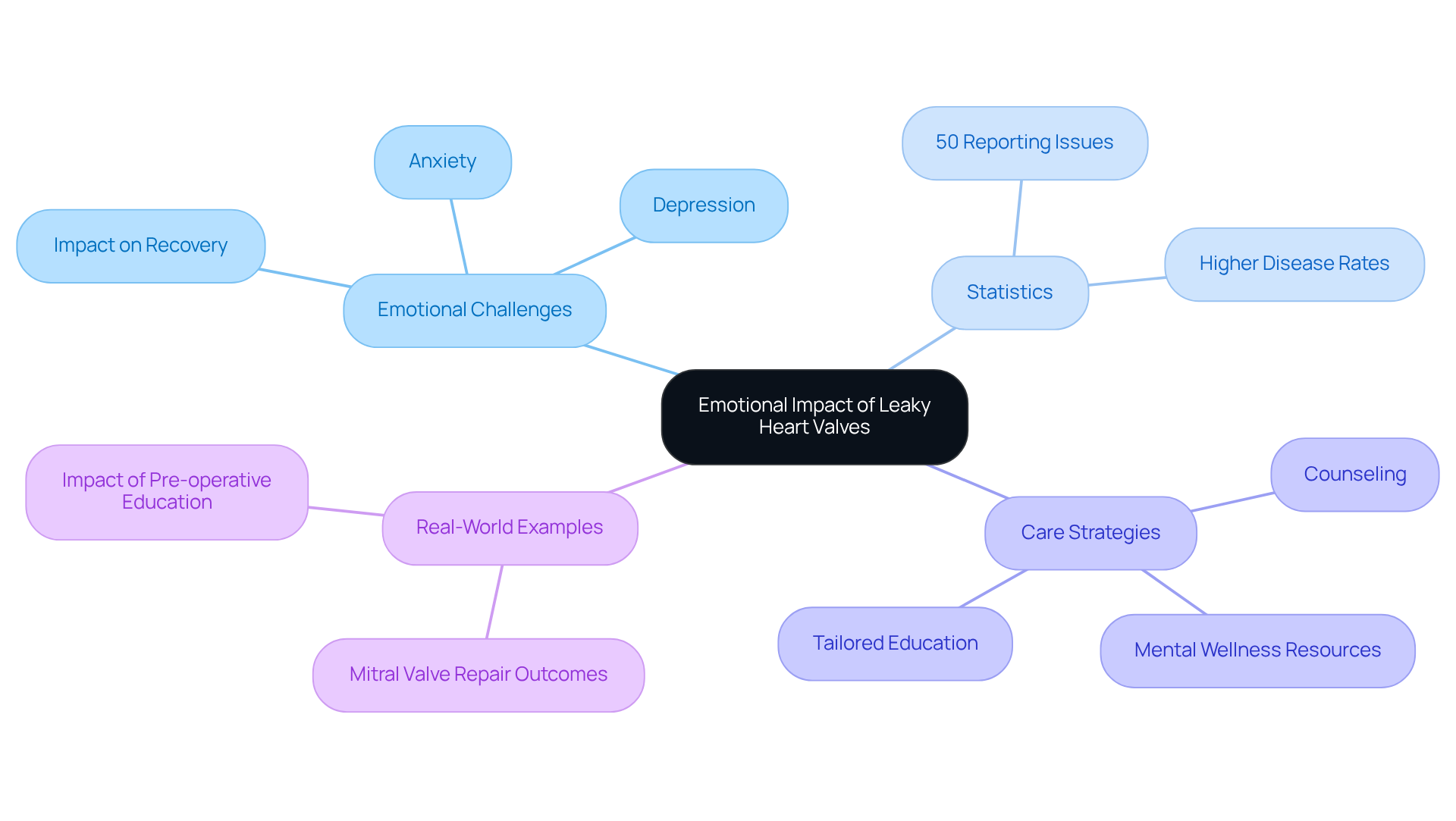
The leaking heart valve life expectancy can vary widely for individuals with leaking valve conditions, influenced by factors such as the severity of the condition, the timing of diagnosis, and the treatment options available. At Amavita Heart and Vascular Health®, we understand how crucial early intervention is. Our specialists use advanced diagnostic imaging and minimally invasive procedures to ensure timely management, which can significantly improve outcomes for individuals.
Have you considered how lifestyle modifications can impact your heart health? Embracing a cardiovascular-friendly diet and engaging in consistent physical activity can lead to enhanced cardiac function and overall well-being. It's important to note that 50% of patients with heart failure have an average life expectancy of only 5 years. This statistic underscores the critical need for proactive care.
Real-world examples show that personalized care plans tailored to individual needs can lead to improved management of symptoms and overall well-being. Our cardiologists at Amavita emphasize that addressing both physical and emotional health is essential. As one specialist observed, "The healing process necessitates more than science; it requires engaging individuals’ positive expectations and inspiring faith in their treatment."
Furthermore, the American Heart Association states that "CVD is largely still a preventable disease," reinforcing the significance of lifestyle changes and early intervention in managing cardiovascular health. Key factors influencing outcomes and the leaking heart valve life expectancy for individuals with heart valve conditions include adherence to prescribed therapies, regular monitoring, and proactive lifestyle modifications.
Studies indicate that individuals who participate in early interventions, like those provided at Amavita, can lower the risk of complications and enhance their prognosis. With CVD-related deaths occurring every 38 seconds on average in the US, it’s crucial for patients to collaborate closely with their healthcare providers. Together, we can develop comprehensive care strategies that encompass all aspects of your health. Remember, you’re not alone in this journey; we’re here to support you every step of the way.
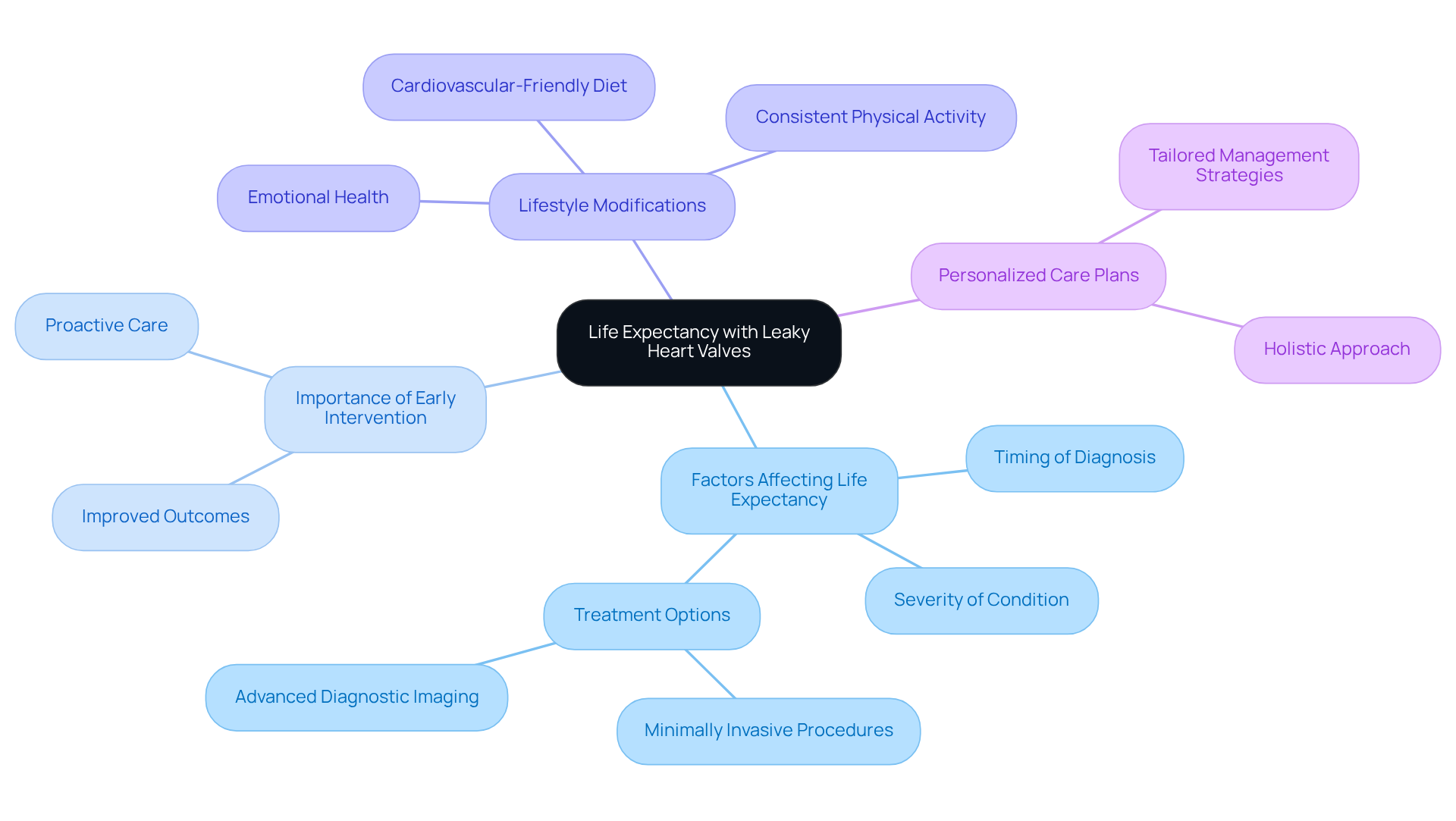
Understanding the complexities surrounding leaking heart valves is crucial for anyone concerned about their cardiovascular health. The life expectancy associated with this condition can vary significantly based on factors such as:
Early intervention and proactive management play a vital role in improving outcomes and enhancing quality of life.
Have you noticed symptoms like shortness of breath or fatigue? These can often be indicators of underlying issues, making awareness and timely medical attention essential. In addition to this, lifestyle modifications—such as adopting a heart-healthy diet and engaging in regular exercise—can profoundly impact overall well-being and potentially extend life expectancy. The importance of regular monitoring cannot be overstated; routine check-ups allow for early detection of complications and timely interventions.
Ultimately, addressing both the physical and emotional aspects of living with leaking heart valves is paramount. With comprehensive care strategies, including advanced treatment options and mental health support, individuals can navigate their health journey more effectively. Embracing these insights not only empowers patients but also highlights the significance of collaboration with healthcare providers to foster better health outcomes. Taking proactive steps today can lead to a healthier tomorrow.
What services does Amavita Heart and Vascular Health offer for leaky heart valves?
Amavita Heart and Vascular Health provides exceptional cardiovascular services, including advanced techniques like cardiac catheterization and chamber repair, as well as minimally invasive procedures to ensure the best possible care and quicker recovery.
Who leads the team at Amavita Heart and Vascular Health?
The team at Amavita Heart and Vascular Health is led by Dr. Pedro Martinez-Clark, who is educated at Harvard and specializes in cardiovascular care.
What are the common symptoms of leaky heart valves?
Common symptoms of leaky heart valves include shortness of breath, fatigue, palpitations, swelling in the legs or abdomen, chest pain, and a persistent cough.
Why is it important to recognize the symptoms of leaky heart valves early?
Recognizing the symptoms early is essential because timely intervention can significantly improve health and well-being, enhancing the quality of life for those affected.
What are some underlying causes of heart valve leakage?
Underlying causes of heart valve leakage include age-related degeneration, congenital defects, rheumatic fever, infective endocarditis, elevated blood pressure, and coronary artery disease.
How does age affect the risk of heart valve leakage?
Age-related degeneration can lead to conditions like aortic regurgitation, often beginning to show signs in individuals around the ages of 40 to 50, making regular health check-ups essential for early detection.
What is the TriClip procedure, and what are its benefits?
The TriClip procedure is a minimally invasive treatment for leaking heart valves. Recent studies indicate that 87% of individuals undergoing this procedure reported significant improvements in their condition.
How does Amavita Heart and Vascular Health approach patient care?
Amavita Heart and Vascular Health emphasizes a patient-centered approach, combining compassionate care with medical expertise to support individuals throughout their health journey.
What community health initiatives does Amavita participate in?
Amavita is involved in community health initiatives such as the Miami Initiative to Stop Amputation (MISA), reflecting their commitment to improving lives beyond the clinic.
How can individuals seek support regarding their cardiovascular health at Amavita?
Individuals can reach out to Amavita Heart and Vascular Health with any questions or concerns they may have about their cardiovascular health, as the team is dedicated to providing support and care.